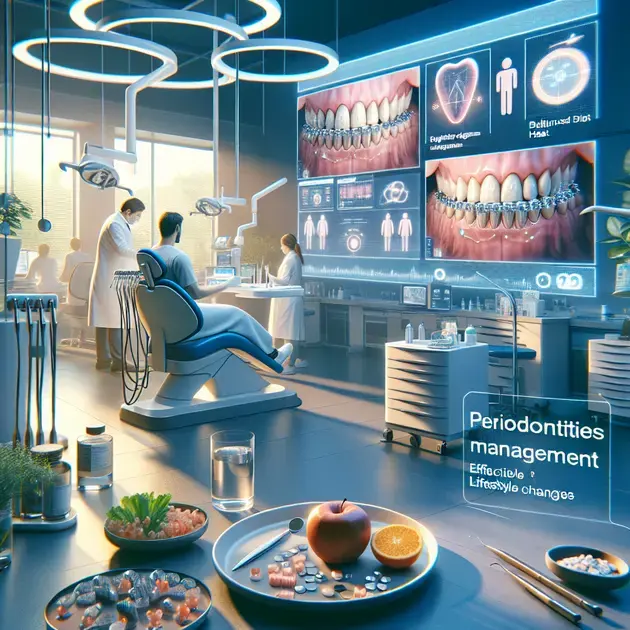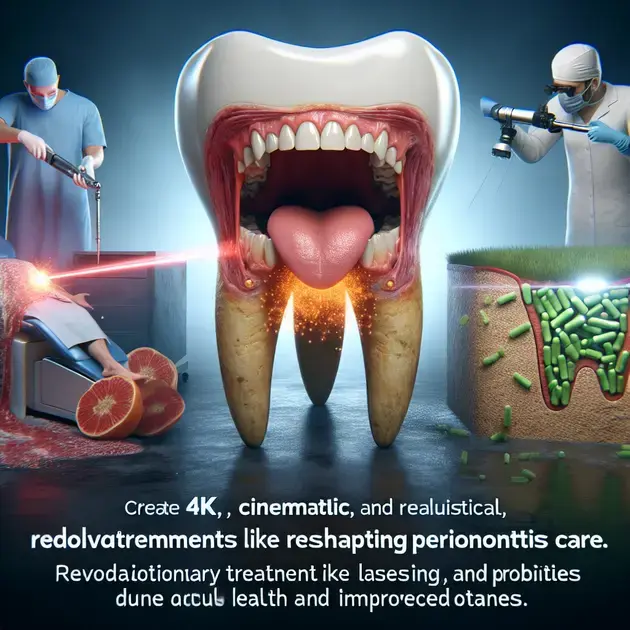When it comes to periodontitis treatment, understanding medications plays a crucial role in managing the condition effectively. Medications are often prescribed in combination with other treatments to help control infection, reduce inflammation, and promote healing in the gums.
Recent studies have shown that certain antibiotics, such as doxycycline and minocycline, can be effective in treating periodontitis when used in conjunction with scaling and root planing. Understanding how these medications work and their potential side effects is essential for patients undergoing treatment for periodontitis.

Understanding the Role of Medications in Periodontitis Treatment
Medications play a crucial role in the treatment of periodontitis, a serious gum infection that damages the soft tissue and destroys the bone that supports your teeth. The primary goal of medications in periodontitis treatment is to reduce inflammation, control bacterial infections, and promote healing. Understanding how medications work in combating periodontitis is essential for effective management of the condition.
Step-by-Step Guide:
- Consult with your dentist or periodontist to determine the most suitable medication for your condition.
- Follow the prescribed dosage and frequency of the medication to ensure optimal effectiveness.
- Monitor any side effects or changes in your oral health while taking the medication and report them to your healthcare provider.
- Incorporate good oral hygiene practices such as regular brushing, flossing, and dental cleanings to complement the medication treatment.
- Attend follow-up appointments to assess the progress of your periodontitis treatment and make any necessary adjustments to the medication regimen.
By following these steps and working closely with your healthcare provider, you can maximize the benefits of medications in managing periodontitis and improving your oral health.
The Effectiveness of Antibiotics for Periodontitis
Antibiotics are frequently used in conjunction with other periodontal treatments to combat bacterial infections and reduce inflammation in patients with periodontitis. The effectiveness of antibiotics for periodontitis depends on various factors such as the type of antibiotic prescribed, the severity of the infection, and the patient’s overall health.
Step-by-Step Guide:
- Undergo a thorough evaluation by your dental provider to determine if antibiotics are needed as part of your periodontitis treatment plan.
- Follow the prescribed antibiotic regimen precisely, including the dosage and duration of treatment, to achieve optimal results.
- Be aware of potential side effects associated with antibiotics and report any adverse reactions to your healthcare provider immediately.
- Combine antibiotic therapy with good oral hygiene practices and professional dental cleanings for comprehensive management of periodontitis.
- Regularly monitor your progress and attend follow-up appointments to assess the effectiveness of antibiotic therapy in treating your periodontal infection.
By following these guidelines and taking antibiotics as prescribed, you can enhance the effectiveness of your periodontitis treatment and improve your oral health outcomes.
Understanding Potential Side Effects and Benefits of Medications
While medications play a critical role in managing periodontitis, it is essential to be aware of the potential side effects and benefits associated with these drugs. Understanding the risks and advantages of medications can help you make informed decisions about your treatment plan and optimize the outcomes of therapy.
Step-by-Step Guide:
- Discuss the potential side effects and benefits of medications with your healthcare provider before starting treatment for periodontitis.
- Monitor your oral health and overall well-being while taking medications to identify any adverse reactions or positive outcomes.
- Report any concerning symptoms or changes in your condition to your dentist or periodontist promptly for evaluation and management.
- Weigh the risks and benefits of medication therapy in consultation with your healthcare provider to ensure the most favorable treatment approach.
- Stay informed about new developments in medication options for periodontitis and be proactive in discussing these updates with your dental team.
By staying vigilant about potential side effects and benefits of medications, you can actively participate in your periodontitis treatment and achieve optimal oral health results.

Understanding the Impact of Laser Therapy in Periodontitis Treatment
Laser therapy has emerged as a promising treatment option for periodontitis, offering precise and targeted intervention to combat the disease. By utilizing focused beams of light energy, laser therapy can effectively remove inflamed tissue, reduce bacteria, and stimulate the regeneration of healthy gum tissue. Studies have shown that laser therapy can lead to improved periodontal health outcomes, including reduced pocket depths and increased attachment levels.
One of the key advantages of laser therapy in periodontitis treatment is its minimally invasive nature. Unlike traditional surgical procedures, laser therapy causes minimal discomfort and requires less downtime for patients. Additionally, laser therapy is associated with lower risks of infection and complications, making it a safe and effective option for managing periodontitis.
Another benefit of laser therapy is its ability to target specific areas of the mouth with precision. This targeted approach allows clinicians to treat affected areas without damaging surrounding healthy tissue, resulting in better outcomes and faster healing times. Laser therapy can also be combined with traditional dental treatments to enhance overall results in managing periodontitis.
Overall, laser therapy offers a promising alternative for individuals seeking effective and minimally invasive treatment for periodontitis. With its ability to target bacteria, reduce inflammation, and promote tissue regeneration, laser therapy is reshaping the way we approach periodontal care.
The Role of Probiotics in Managing Periodontitis Symptoms
Probiotics have gained attention in recent years for their potential role in managing periodontitis symptoms. These beneficial bacteria can help restore balance to the oral microbiome, reducing inflammation, fighting harmful bacteria, and promoting gum health. By introducing probiotics through supplements or probiotic-rich foods, individuals may experience improved periodontal health outcomes.
Studies have shown that probiotics can help reduce gingival inflammation, decrease pocket depths, and support the maintenance of healthy gum tissue. Probiotics work by competing with harmful bacteria for resources and inhibiting their growth, thus restoring a healthier balance in the oral microbiome. Incorporating probiotics into a periodontitis management plan can complement traditional treatments and enhance overall results.
Probiotics offer a natural and non-invasive approach to supporting periodontal health, making them an attractive option for individuals looking to optimize their oral care routine. With their ability to target the root cause of gum disease and promote a healthier oral environment, probiotics play a valuable role in managing periodontitis symptoms and supporting overall gum health.
By incorporating probiotics into daily oral care practices, individuals can take proactive steps towards preventing and managing periodontitis, leading to improved oral health outcomes in the long run.
Embracing Lifestyle Changes for Effective Periodontitis Management
Lifestyle changes play a crucial role in effective periodontitis management, as they can help address underlying risk factors and promote better periodontal health. By adopting healthy habits and making positive adjustments to one’s daily routine, individuals can support the success of periodontal treatments and maintain optimal oral health.
One key lifestyle change for managing periodontitis is maintaining good oral hygiene practices, including regular brushing, flossing, and dental check-ups. By keeping the mouth clean and free of plaque buildup, individuals can reduce the risk of gum disease progression and support the effectiveness of treatment interventions.
Additionally, adopting a balanced diet rich in nutrients and low in sugary and acidic foods can benefit periodontal health. Nutrient-dense foods like fruits, vegetables, and lean proteins can help support gum tissue health and overall oral health. Avoiding smoking and excessive alcohol consumption is also important, as these habits can increase the risk of developing periodontitis and hinder treatment outcomes.
Regular exercise and stress management techniques can further contribute to effective periodontitis management by promoting overall well-being and immune system function. By incorporating these lifestyle changes into their daily routine, individuals can take proactive steps towards improving their periodontal health and overall quality of life.
Conclusion
In conclusion, the impact of laser therapy in periodontitis treatment is significant. Laser therapy offers a precise and targeted intervention, removing inflamed tissue, reducing bacteria, and stimulating the regeneration of healthy gum tissue. With its minimally invasive nature and lower risks of infection, laser therapy stands out as a safe and effective option for managing periodontitis. The ability to target specific areas with precision allows for better outcomes and faster healing times, enhancing overall results in periodontal care.
Moreover, probiotics play a crucial role in managing periodontitis symptoms by restoring balance to the oral microbiome and promoting gum health. By reducing inflammation, decreasing pocket depths, and supporting healthy gum tissue, probiotics offer a natural and non-invasive approach to periodontal health. Incorporating probiotics into daily oral care routines can lead to improved oral health outcomes and prevent the progression of periodontitis in the long run.
Lastly, embracing lifestyle changes is key to effective periodontitis management. By maintaining good oral hygiene practices, adopting a balanced diet, avoiding harmful habits like smoking and excessive alcohol consumption, and engaging in regular exercise and stress management, individuals can support the success of periodontal treatments and achieve optimal oral health. These lifestyle changes not only benefit periodontal health but also contribute to overall well-being and quality of life.



